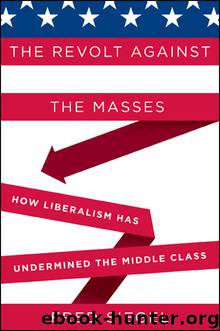The Revolt Against the Masses by Siegel Fred

Author:Siegel, Fred [Siegel, Fred]
Language: eng
Format: epub
ISBN: 9781594036996
Publisher: Encounter Books
When World War II ended in 1945, the New York intellectual Delmore Schwartz kept repeating, “It’s 1919 over again.” The philosopher William Barrett, a friend of his, explained Schwartz’s excitement: “Our generation had been brought up on the remembrance of the 1920s as the great golden age of the avant-garde. . . . We expected history to repeat itself.”
And in some ways it did. An incessant flow of talk and writing about “mass society” and “mass culture” was the amniotic fluid from which young liberals emerged in the 1950s and 1960s. In her 2001 memoir, the critic Nora Sayre described the climate of opinion in that era: The Hollywood writers and New York leftists around whom she grew up in the 1950s shared Mencken’s scabrous view of the booboisie and his loathing of Main Street; these were “the values and tropisms,” she said, that were “very much alive in our living room.” Literary critic Richard Chase concurred. Writing in the 1950s, he argued that “radicalism today in America means (with certain differences) what it meant to Randolph Bourne in 1917.”
With each new advance in American prosperity, the reactionary vision of Huxley and Ortega gained ground even as its targets shifted. In the 1950s version of the mass-culture critique, the men and women of America were said to have become alienated from their authentic selves not by the conformist Babbitts but by a pervasive popular culture that kept them in a state of vegetative torpor. Everything from women’s magazines to radio to comic books was implicated in this scheme, driven by the need of American capitalists to keep people in a perpetual state of false consciousness.
Mass Culture: The Popular Arts in America, a 1956 collection of essays co-edited by Bernard Rosenberg, a contributing editor of the Socialist magazine Dissent, explained the dangers at hand. “Contemporary man finds that his life has been emptied of meaning, that it has been trivialized,” Rosenberg wrote. “He is alienated from his past, from his work, his community, and possibly from himself—although this ‘self’ is hard to locate. At the same time he has an unprecedented amount of time on his hands which he must kill . . . lest it kill him.”
The evidence for this epidemic of inauthenticity was 561 pages of articles on such pressing concerns as “The Problem of the Paper-Backs,” “Card-playing as Mass Culture,” and “Television and the Patterns of Mass Culture.” One short article by Irving Howe, a co-founder of Dissent who would go on to become a distinguished literary critic, contained the following passage:
On the surface the Donald Duck and Mickey Mouse cartoons seem merely pleasant little fictions but they are actually over laden with the most aggressive, competitive, and sadistic themes. On the verge of hysteria, Donald Duck is a frustrated little monster who has something of the SS man in him and whom we, also having something of the SS man in us, naturally find quite charming.
Howe would eventually distance himself from such effusions and mock “the endless chatter about ‘conformity’ that has swept the country.
Download
This site does not store any files on its server. We only index and link to content provided by other sites. Please contact the content providers to delete copyright contents if any and email us, we'll remove relevant links or contents immediately.
| Anarchism | Communism & Socialism |
| Conservatism & Liberalism | Democracy |
| Fascism | Libertarianism |
| Nationalism | Radicalism |
| Utopian |
The Secret History by Donna Tartt(19002)
The Social Justice Warrior Handbook by Lisa De Pasquale(12177)
Thirteen Reasons Why by Jay Asher(8874)
This Is How You Lose Her by Junot Diaz(6857)
Weapons of Math Destruction by Cathy O'Neil(6248)
Zero to One by Peter Thiel(5767)
Beartown by Fredrik Backman(5717)
The Myth of the Strong Leader by Archie Brown(5482)
The Fire Next Time by James Baldwin(5409)
How Democracies Die by Steven Levitsky & Daniel Ziblatt(5200)
Promise Me, Dad by Joe Biden(5130)
Stone's Rules by Roger Stone(5065)
A Higher Loyalty: Truth, Lies, and Leadership by James Comey(4937)
100 Deadly Skills by Clint Emerson(4900)
Rise and Kill First by Ronen Bergman(4761)
Secrecy World by Jake Bernstein(4727)
The David Icke Guide to the Global Conspiracy (and how to end it) by David Icke(4685)
The Farm by Tom Rob Smith(4489)
The Doomsday Machine by Daniel Ellsberg(4474)
